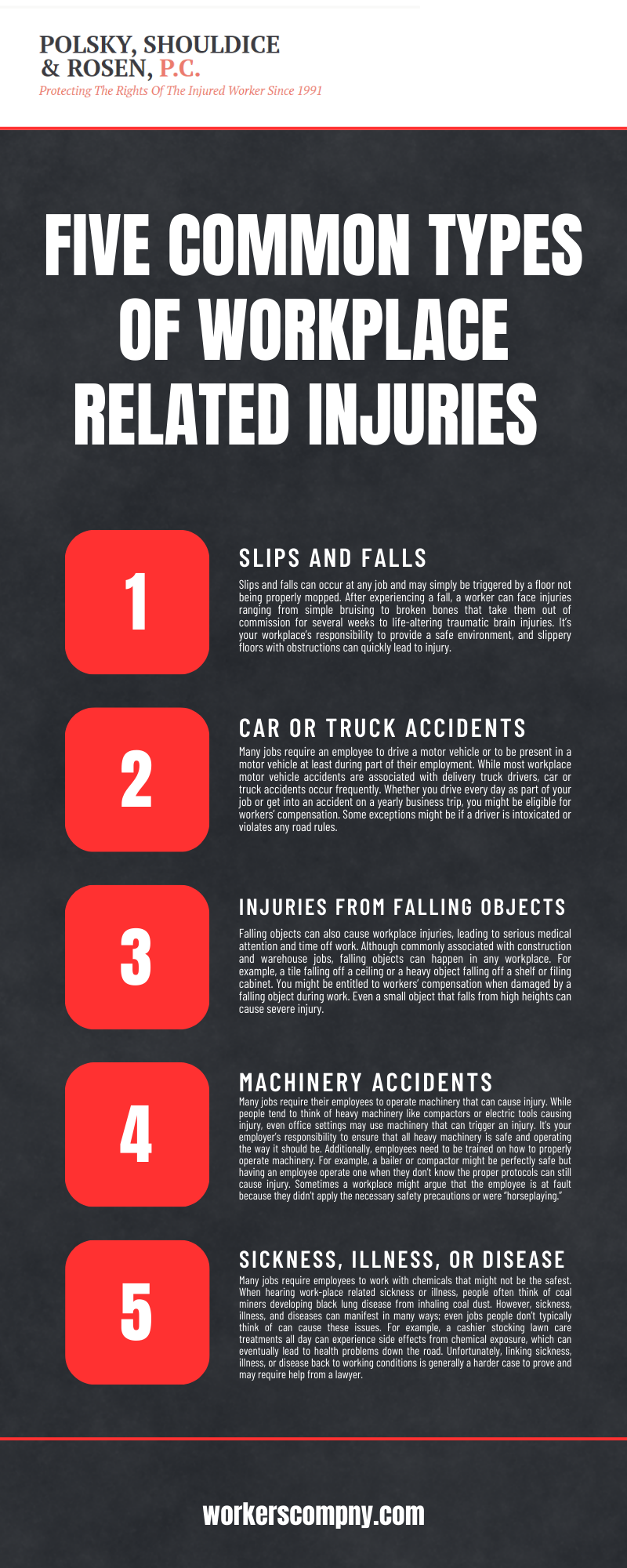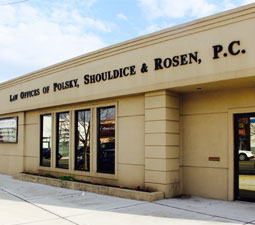Denial of Workers' Compensation Claims
The denial of Workers' Compensation claims can pose significant challenges for employees who have suffered injuries on the job. Understanding your rights and the avenues available for contesting such denials is crucial. At Polsky, Shouldice & Rosen, P.C., since 1991, we have dedicated ourselves to advocating for the rights of injured workers in Queens, NY, ensuring they receive the compensation they rightfully deserve.
Table Of Contents
- Common Grounds For Claim Denial
- Workplace Related Injuries Infographic
- The Value Of Legal Representation
- Workers' Compensation FAQs
Going through any type of injury is a stressful experience. However, if you were injured in the workplace and you are not receiving fair compensation, it can be extremely frustrating and scary due to financial challenges. If this is your situation, you should consider working with a trusted legal team who will put your best interests as their top priority: Polsky, Shouldice & Rosen, P.C. We are Workers' Compensation lawyers in Queens NY who are dedicated to protecting the rights of injured employees.
If you sustained a serious injury while at work, experienced Workers' Compensation attorneys in Queens NY will probably tell you that it’s best if your claim is approved the first time. The sooner you get started on a claim and make sure the details are accurate, the more likely it will be processed and approved. Otherwise, you might have to pay for medical expenses out of your own pocket, and you might have to call in sick without pay until you recover. That’s a double whammy. Those are all issues you don’t have to deal with. Avoid the headache by doing your claim the right way. Workers' Compensation can be tricky to understand, but a good legal team will spend the time with you to simplify the process. Call Polsky, Shouldice & Rosen, P.C. to schedule a complimentary consultation with a knowledgeable Workers' Compensation lawyer from our firm.
We have extensive experience handling claims for injured workers. We also have an outstanding record of success in gaining the maximum amount of compensation possible for our clients. This is because of our years of experience and because we have a thorough understanding of employment law and Workers' Compensation. A qualified and reputable lawyer knows how important it is to go above and beyond for every client. We are committed to fighting hard for our clients and building the best case for them so they can get back on their feet and speed up their recovery. While an attorney can provide a thorough explanation of how Workers' Compensation is handled, there are recommended action steps clients should take to increase the likelihood of an approved claim early on. Here are five suggestions we have that can improve your chances of getting your claim approved the first time. However, one of our Workers' Compensation attorneys in Queens NY will be happy to handle the claims process for you, even if your claim was initially denied.
- Get medical attention for your injury. Request copies of all of the doctor’s notes and your medical receipts in order to include them in your claim. Make sure each symptom you’re experiencing is noted and double check the accuracy of the doctor’s report. After an injury, it’s best to seek medical help right away, whether or not you feel fine after suffering an injury. Not taking this step can send the wrong message to insurance companies, making them inclined to dismiss your claim. This can go a long way towards proving that your injury is valid. You don’t want your claim to be rejected because you refused to get the proper medical attention.
- Notify your employer or supervisor that you sustained a workplace injury and how it happened. As soon as you can, take notes about what date and time you notified them, what you told them, and their responses. Having the detailed record will strengthen your evidence. What precautions or warnings were put in place after the injury occurred? Was your employer’s action appropriate and timely? Later, if they accuse you of not having notified them, you can counter with your documentation.
- As soon as possible, talk to anyone who witnessed your workplace accident. Obtain their contact info for future reference. Ask them to write in their own words with as much detail as they can what they saw in terms of how the accident happened and any other relevant information. Ideally, get their testimony on video as well. Using your cell phone to record it should be fine, as long as the video and audio are clear.
- Take photos if possible of your workplace where the accident occurred. Do not move anything at the location or adjust any objects in the area. Be mindful to take photos from every angle and make sure your photos aren’t blurry.If you’re unable to do this, request a coworker to do this on your behalf. It’s important to get as many images of the hazardous condition or details relevant to your accident, and to do this before your employer removes the hazard. It’s possible that they could claim the hazardous condition never existed, and so having visual proof can greatly enhance the strength of your Workers' Compensation claim.
- Hire a law firm whose Queens Workers' Comp lawyers have a good track record of negotiating settlements for their clients. Your lawyer can review your case, examine your documentation and paperwork, and provide guidance as to strengthening your claim. If needed, one of our Queens Workers' Comp lawyers can refer you to a trusted physician who can provide a second opinion as to your condition. This is important because your employer’s Workers' Compensation carrier will probably require that you see one of their doctors. Their doctor is not necessarily going to provide an objective opinion as to the extent of your injury or how you might have sustained it. The doctor could claim your injury isn’t serious, or that it’s not possible that you were injured in that way at work. That’s why it’s recommended you get another doctor’s opinion as well in case crucial details in the medical report are downplayed or left out.
The Struggle for Fair Compensation
Experiencing an injury in the workplace can lead to a multitude of challenges, not least of which is securing fair compensation. When injuries are compounded by financial strain due to unfair compensation practices, the situation can become unbearable. Our team at Polsky, Shouldice & Rosen, P.C. is committed to guiding you through this complex legal landscape, placing your best interests at the forefront of our efforts.
Common Grounds for Claim Denial
Understanding why Workers' Compensation insurers may deny claims can provide valuable insights into how to effectively counter such decisions. Common reasons include:
- Lack of Witnesses: Insurers may question the legitimacy of claims that lack eyewitness accounts. Reporting the incident immediately to supervisors and coworkers is vital.
- Inconsistencies in Reporting: Discrepancies between accident reports and medical records can lead to claim denials. Consistency in your accounts is key.
- Presence of Illegal Substances: Claims may be denied if medical tests reveal illegal drugs in the employee's system at the time of the accident.
- Post-Termination Claims: Filing a claim after being laid off or fired can raise suspicions, leading to denials.
Taking Action: How to Respond to Claim Denials
Facing a claim denial is not the end of the road. Key steps to contest the decision include:
- Prompt Reporting: Always report injuries immediately to mitigate disputes over the incident's occurrence.
- Consistent Communication: Ensure your accounts to healthcare providers and supervisors are consistent.
- Seek Legal Counsel: Engaging with experienced Workers' Compensation lawyers can make a significant difference in overturning denials.
Partnering with Polsky, Shouldice & Rosen, P.C.
Choosing the right legal team is critical. Our commitment to protecting the rights of injured employees sets us apart. With a track record of success since 1991, we are equipped to navigate the complexities of Workers' Compensation claims, striving for the best possible outcomes for our clients.
Understanding Workers' Compensation Claims
Filing a Workers' Compensation claim should ideally be a straightforward process, but it can quickly become mired in complexity. Whether it's due to employer resistance or insurance company tactics, legal assistance may become necessary. From gathering evidence to representing you in hearings, a skilled lawyer can provide invaluable support.
WORKPLACE RELATED INJURIES INFOGRAPHIC
The Value of Legal Representation
Navigating Workers' Compensation claims requires not just legal knowledge but also strategic insight. At Polsky, Shouldice & Rosen, P.C., we bring both to the table. Our expertise allows us to counter common tactics employed by insurers and employers, aiming to secure the compensation you need for recovery.
When to Consider Legal Help
If you encounter any of the following scenarios, seeking legal assistance is advisable:
- Complex Claims: If your claim involves severe injuries, potential permanent disability, or contentious issues regarding fault.
- Denied Benefits: If your legitimate claim has been unjustly denied, legal intervention can be crucial.
- Retaliatory Actions: If you face workplace retaliation for filing a claim, legal protections can safeguard your rights.
Queens Workers’ Compensation Statistics
According to statistics from the National Institute for Occupational Safety and Health (NIOSH), the three leading causes of work-related injuries treated in an emergency department are contact with objects and equipment, overexertion and bodily reaction, and falls, slips and trips without a fall.
If you have been injured on the job, make sure to contact our office to speak with one of our workers’ compensation lawyers and protect your right to benefits.
Workers' Compensation FAQs
If you’ve recently been injured at work, you may want to speak with Queens NY Workers' Compensation lawyers from Polsky, Shouldice & Rosen, P.C. A lawyer can help you file a timely Workers' Compensation claim and protect your legal rights. He or she will guide through the entire process and give you peace of mind.
Why Do Workers' Compensation Claims Get Denied?
Many initial Workers' Compensation claims get denied for one reason or another. For example, if your employer doesn’t believe that you were injured at work or you have a preexisting injury, they may decide to reject your claim. Likewise, if you didn’t report your injury by deadline, your claim can get rejected. While it can be discouraging to get your initial claim denied, you don’t have to give up. If you believe that your employer wrongfully denied your claim, you can file an appeal.
Can I Still Get Workers' Compensation Benefits If the Accident Was My Fault?
This is a common question that people have when filing for Workers' Compensation benefits. They may worry that they can’t receive compensation if the accident was their fault. However, fault isn’t actually a factor considered in Workers' Compensation cases. Therefore, if you got into an accident because you weren’t paying attention, you can still get compensated. On the other hand, if you got hurt while you were under the influence of alcohol or drugs, your Workers' Compensation claim will be denied.
Can I Obtain Workers' Compensation Benefits If There Were No Witnesses?
Yes. As Queens Workers' Compensation lawyers can confirm, witnesses have no bearing on a Workers' Compensation case. In fact, witnesses aren’t usually present at a work accident. As long as you were injured while performing work duties, you may be eligible for benefits. Just be sure to notify your employer about your injuries as soon as possible. In New York, you’re required to report work injuries within 30 days of the accident.
Should I Disclose Pre-Existing Injuries?
Absolutely. Some workers may neglect to tell their doctor about pre-existing injuries because they’re afraid their case will get denied. However, trying to hide pre-existing injuries can hurt your case even more. It’s actually quite common for people to injure the same area more than once. It doesn’t mean that your current injury isn’t legitimate. You may still receive compensation for it. However, if your employer is trying to reject your claim because of a pre-existing injury, you should let your lawyer know.
Can I Make a Claim Against a Third-Part for My Injuries?
Yes, if a third-party contributed to your work injuries in some way, you may be able to file a separate third-party claim against them and receive higher compensation. For instance, if you drive as part of your job and were in a car accident caused by a distracted driver, you may have a third-party claim. Likewise, if you were injured by faulty equipment at work, you may file a claim against the manufacturer.
Schedule a consultation with Queens Workers' Compensation lawyers from Polsky, Shouldice & Rosen, P.C.
What Is Workers' Compensation?
Workers' Compensation is an insurance program that provides compensation to individuals who got hurt on the job. The amount of money you might receive from a Workers' Compensation claim depend on several factors, like the severity of the injury and the cost of your medical bills.
If your Workers' Compensation lawyer Queens NY respects wins your case, you may have the options of choosing between a lump sum and a structured settlement. In a lump sum settlement, you agree to receive a single payment as compensation. If you choose a structured settlement, you may receive smaller payments over a period of time.
Are All On-the-Job Injuries Covered?
Workers' Compensation covers the majority of injuries endured on the job, even if the injured employee was technically responsible. However, there are a few instances where Workers' Compensation plans may not apply. For example, if an employee was under the influence of drugs or alcohol during the incident, Workers' Compensation may likely be denied.
Workers' Compensation policies may also restrict compensation for self-inflicted injuries, injuries that occurred while the employee violated employee conduct, and injuries suffered while an employee was committing a crime.
When you meet with a Workers' Compensation lawyer Queens NY counts on for the first time, try to remember every detail about the incident. The success of a Workers' Compensation claim may be determined by small factors.
What Can a Workers' Compensation Lawyer in Queens NY Do?
Although it is possible to file a Workers' Compensation claim by yourself, you may get a better outcome if you hire an experienced Workers' Compensation lawyer Queens NY relies on. Here are some of the benefits of working with a Queens NY Workers' Compensation lawyer:
- Gather Sufficient Evidence: A Workers' Compensation lawyer may help you gather all the necessary evidence you need to prove your case. After reviewing your case, he or she may know what evidence is required to get you fair compensation.
- Negotiate a Fair Settlement: A Workers' Compensation lawyer may likely know the value of your claim and may negotiate with the insurance company to win you a fair settlement.
- Representation at Hearings: Going to your hearing can be very intimidating, especially if your claim was initially denied. An experienced Workers' Compensation lawyer may help you prepare for hearings and may act as your representative during settlement negotiations.
Is a Lawyer Necessary to get Workers’ Compensation?
If you’ve been seriously injured on the job, you may benefit from speaking with workers’ compensation lawyers Queens, NY trusts from Polsky, Shouldice & Rosen, P.C. A free consultation could help you decide if you need an attorney.
For many people, hiring Queens workers’ compensation lawyers has been beneficial when filing a claim or lawsuit. This article could help you decide if it’s time to call some experienced workers’ compensation lawyers in Queens, NY from Polsky, Shouldice & Rosen, P.C.
Contact Workers' Compensation Lawyers Queens NY Recommends
Workers' Compensation claims represent more than just legal challenges; they are critical to the well-being and recovery of injured workers. At Polsky, Shouldice & Rosen, P.C., we understand the stakes. Our commitment to our clients goes beyond legal representation; we offer support, guidance, and unwavering advocacy. If you're facing difficulties with your Workers' Compensation claim, don't navigate this journey alone. Contact us for a consultation and let us fight for the compensation and justice you deserve.
Polsky, Shouldice & Rosen, P.C. is here to provide the expert legal assistance you need. Reach out to our team for a free consultation, and let us help you secure the compensation you're entitled to. Visit our website or call our office to schedule your appointment today.
Common Mistakes Employees Make After A Workplace Injury
Workplace injuries and the workers’ complication system can be complex, especially for employees who are not sure of how to handle the aftermath. Missteps in the process of filing for workers’ compensation or seeking medical attention can delay benefits or even jeopardize a claim. We’ve compiled a list of common mistakes employees make after a workplace injury to help you avoid unnecessary hurdles. Our Queens, NY workers’ compensation lawyer can help you address your case if you are in need of legal guidance.
Delaying Medical Treatment
One of the most common mistakes is waiting to seek medical care after an injury. Even if the injury seems minor, delaying treatment can affect your health and your claim. Prompt medical attention creates documentation linking the injury to your job, which an employee accident lawyer can play a crucial role in the claims process.
Failing To Report The Injury Right Away
Many employees don’t realize there’s often a deadline for reporting workplace injuries to their employer. Waiting too long to report the incident can raise questions about the validity of your claim. Be sure to inform your supervisor or employer as soon as possible and follow the company’s reporting procedures.
Not Documenting The Incident
It can be challenging to prove how and when the injury occurred without the proper documentation. Keep a detailed record of the accident, including the time, place, and names of any witnesses. Photos of the injury and the accident site can also strengthen your claim.
Assuming All Injuries Are Covered
Not all injuries qualify for workers’ compensation benefits. For example, injuries resulting from intoxication, horseplay, or a personal dispute might not be eligible. Understanding what qualifies can help you determine whether you should pursue a claim.
Ignoring Follow-Up Medical Appointments
Following your doctor’s recommendations and attending all follow-up appointments is crucial. A work injury claims lawyer shares that ignoring these steps can imply that the injury isn’t as severe as claimed. Be consistent with your treatment plan to avoid any disputes about your condition.
Giving Incomplete Or Inconsistent Statements
It’s important to provide accurate and consistent information throughout the claims process. Contradictory statements about the incident or your injuries can harm your credibility and potentially lead to a denied claim.
Returning To Work Too Soon
Returning to work before you’re fully recovered can aggravate your injury and potentially harm your case. An employee injury attorney recommends that you speak with your doctor and employer to determine when it’s safe for you to resume work duties.
Not Consulting A Lawyer When Needed
Many employees try to handle their workers’ compensation claim on their own, which can lead to issues if the claim is denied or disputed. Seeking advice from a workers’ compensation attorney, such as a Queens workers’ compensation lawyer, can help clarify your rights and improve your chances of a fair outcome.
Overlooking Retaliation Protections
Some employees worry about facing retaliation from their employer after filing a workers’ compensation claim. Laws are in place to protect workers from being penalized for reporting injuries, but it’s important to understand these rights to safeguard your job and benefits.
Protecting Your Rights After A Workplace Injury
A job injury lawyer can help victims to avoid common mistakes that may occur following a workplace injury. Workplace injuries can be overwhelming, but avoiding common mistakes can make the recovery process smoother. By taking immediate action, documenting the incident, and following medical advice, employees can better position themselves for a successful workers’ compensation claim. If you’re dealing with a workplace injury, it’s important to explore your legal options with our Queens workers’ compensation lawyer, we have been representing injured clients since 1991. Contact us for guidance, as Polsky, Shouldice & Rosen, P.C. has helped many individuals navigate similar situations. For more information about how we can help you with your case, schedule a complimentary consultation with a member of our team today.
Queens Workers' Compensation Glossary
At Polsky, Shouldice & Rosen, P.C., we are committed to advocating for injured workers in Queens, NY. With over 30 years of experience practicing exclusively in New York Workers’ Compensation Law, we are on your side, ready to fight for the benefits you deserve. Here, we’ve compiled key legal terms and jargon related to workers’ compensation claims to help you better understand the process.
Medical Evidence
Medical evidence plays a crucial role in any workers’ compensation claim. This includes documentation such as medical records, doctors' notes, diagnostic test results, and treatment plans. For example, if an employee in Queens suffers a back injury while lifting heavy equipment, X-ray results and a detailed physician's report can substantiate the claim. Consistency between medical reports and the worker’s account is essential for avoiding claim denials.
Independent Medical Examination (IME)
An IME is a medical assessment conducted by a doctor chosen by the employer’s insurance company. The purpose is to evaluate the nature and extent of the employee's injuries and their ability to work. For instance, if you hurt your wrist operating machinery, the IME doctor might assess whether the injury limits your ability to perform repetitive tasks. Unfortunately, these exams may sometimes downplay the severity of injuries, which is why having a second opinion is often advisable.
Average Weekly Wage (AWW)
The AWW is used to calculate the amount of compensation an injured worker is entitled to receive. It is typically based on the worker's earnings during the 52 weeks prior to the injury. For example, a construction worker earning $1,000 per week before a scaffolding accident may receive benefits calculated as two-thirds of their AWW, depending on the severity of the injury and their ability to return to work.
Notice Of Controversy
A Notice of Controversy is filed by an employer or insurer to dispute a workers’ compensation claim. Common reasons include lack of timely reporting or questions about whether the injury occurred on the job. For instance, if an employee delays reporting a fall at a Queens warehouse, the insurer may use this delay to question the validity of the claim. Keeping accurate records and reporting promptly are critical to countering such disputes.
Temporary Total Disability (TTD) Benefits
TTD benefits provide compensation to workers who are temporarily unable to perform any job duties due to their injuries. For example, an office worker who sustains a debilitating neck injury in a slip-and-fall accident may be entitled to TTD benefits until they recover enough to resume work. These benefits are designed to replace lost wages during the recovery period.
If you’re struggling with a workers’ compensation claim, don’t face it alone. Contact us at Polsky, Shouldice & Rosen, P.C. for dedicated and experienced legal support. Let us help you secure the benefits you deserve.
Client Review
"Justin was amazing for me. Walk me threw the step of how everything works start to finish and just made me feel comfortable. Also got me a lot of money. Had to throw that in. If anyone looking for a good attorney for comp this would be the place. Thanks buddy for everything!"
Vinny Verderosa







